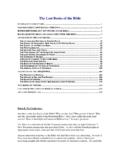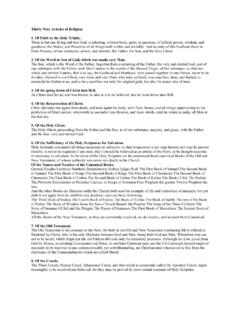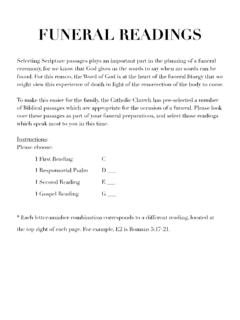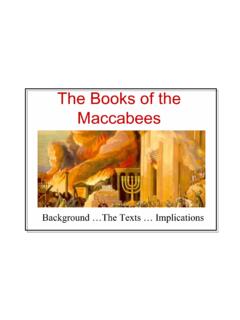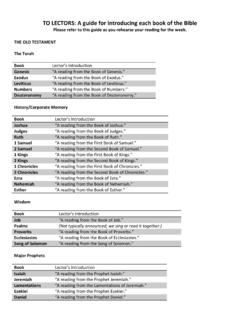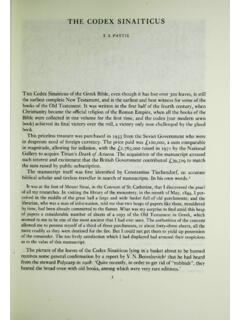Transcription of The Canonization of the Bible - Anchored Resources
1 The Canonization of the Bible The Anchor MBC Night What is Canonization and Why does it Matter? Canonization - Greek rule or standard Hebrew qaneh, meaning a read or stalk The authoritative list of books accepted as Holy Scripture What is Canonization and Why does it Matter? Why are some books included and not others?- See Joshua 10:13 and 1 Chronicles 29:29 Compare Jude 14-15 with Enoch 2:1 Jude 14 15 - And Enoch also, the seventh from Adam, prophesied of these, saying, Behold, the Lord cometh with ten thousands of his saints, to execute judgment upon all, and to convince all that are ungodly among them of all their ungodly deeds which they have ungodly committed, and of all their hard speeches which ungodly sinners have spoken against him.
2 Enoch 2:1 Behold, he comes with ten thousands of his saints, to execute judgment upon them, and destroy the wicked, and reprove all the carnal for everything which the sinful and ungodly have done, and committed against him. What is Canonization and Why does it Matter? Lots of questions to See Joshua 10:13 and 1 Chronicles 29:29 Compare Jude 14-15 with Enoch 2:1 What about other gospels? See Luke 1:1-3 What about the Apocrypha? What about the book of Momon? What is Canonization and Why does it Matter? Important Questions: Why were some books included in canon and other rejected? What is the standard by which they determined which books should be kept? When did the canon close? How do we know it is closed?
3 Where did the concept of canon come from? The Origin of Canon & the Canonization of the Old Testament Deuteronomy 4:2 Ye shall not add unto the word which I command you, neither shall ye diminish ought from it, that ye may keep the commandments of the LORD your God which I command you. The Origin of Canon & the Canonization of the Old Testament Progression of Old Testament Canonization Exodus 25:16 Deuteronomy 31:24-26 1 Samuel 10:25 2 Chronicles 18:4-27 and Daniel 9:2 The Origin of Canon & the Canonization of the Old Testament The books that were later placed into the Old Testament canon were of a self-authenticating nature and did not derive their authority from a person or an ecclesiastical decree.
4 This point is crucial: the books did not receive their authority because they were placed into the canon; they were recognized by the nation of Israel as having divine authority and were therefore included in the canon. - Paul Wegner, The Journey from Texts to Translations The Origin of Canon & the Canonization of the Old Testament What then was the criteria used? Flavius Josephus The Origin of Canon & the Canonization of the Old Testament What then was the criteria used? and this is justly, or rather necessarily done, because every one is not permitted of his own accord to be a writer, nor is there any disagreement in what is written; they being only prophets that have written the original and earliest accounts of things as they learned them of God himself by inspiration; and others have written what hath happened in their own times, and that in a very distinct manner also.
5 - Josephus The Origin of Canon & the Canonization of the Old Testament What then was the criteria used (continued)? .. and how firmly we have given credit to those books of our own nation, is evident by what we do; for during so many ages as have already passed, no one has been so bold as either to add anything to them, to take anything from them, or to make any change in them; but it becomes natural to all Jews, immediately and from their very birth, to esteem those books to contain divine doctrines, and to persist in them, and, if occasion be, willingly to die for them. - Josephus The Origin of Canon & the Canonization of the Old Testament What then was the criteria used? There is no contradiction in the written word It was written by a prophet or one with divine authority It originated through the inspiration of God The Jews recognized and accepted it as divine material.
6 The Origin of Canon & the Canonization of the Old Testament Law (Torah) Prophets (Nebi im) Writings (Kethubim) Genesis The Former Prophets Poetic Books Exodus Joshua Psalms Leviticus Judges Proverbs Deuteronomy Samuel Job Kings Five Scrolls The Latter Prophets Song of Solomon Isaiah Ruth Jeremiah Lamentations Ezekiel Ecclesiastes The book of the Twelve Esther Historical Books Daniel Ezra-Nehemiah Chronicles Jesus view of Old Testament Canon Luke 24:44 Matthew 23:34-35 (also Genesis 4:8 & 2 Chronicles 24:20-22 The Canonization of the New Testament Ephesians 2:20 And are built upon the foundation of the apostles and prophets, Jesus Christ himself being the chief corner stone; The Incorrect View The Correct View The Church is Determiner of Canon The Church is Discoverer of Canon The Church is Mother of Canon The Church is Child of Canon The Church is Magistrate of Canon The Church is Minister of Canon The Church is Regulator of Canon The Church is Recognizer of Canon The Church is Judge of Canon The Church is Witness of Canon The Church is Master of Canon The Church is Servant of Canon The Canonization of the New Testament What then was the criteria used?)
7 There is no contradiction in the written word It was written by a prophet or one with divine authority (an apostle) It originated through the inspiration of God The Jews Churches recognized and accepted it as divine material. The Canonization of the New Testament Apostles had: Qualifications (Acts 1:20-22) Credentials (2 Cor. 12:12) Enablement (John 14:26) Prophets had: Enablement (Acts 11:27-28) Authoritative Words (1 Thess. 5:19-22) The Canonization of the New Testament Time period: Written between 48 and 100 AD Churches copied, distributed, and likely collected New Testament books (Col. 4:16, 1 Thess. 5:27, Rev. 1:11) Public reading of Scripture was a significant part of New Testament church life (1 Tim.)
8 4:13) The Canonization of the New Testament Recognized internal authority: Gal. 1:1, 2 Thess. 3:6-15, 1 Cor. 7:10-12 Paul quotes Matthew or Luke: 1 Timothy 5:18 For the scripture saith, Thou shalt not muzzle the ox that treadeth out the corn. And, The labourer is worthy of his reward. Matthew 10:10 Nor scrip for your journey, neither two coats, neither shoes, nor yet staves: for the workman is worthy of his meat. Luke 10:7 And in the same house remain, eating and drinking such things as they give: for the labourer is worthy of his hire. Go not from house to house. The Canonization of the New Testament Peter recognizes Paul s writings as Scripture (2 Peter 3:16) Jude quotes Peter s writings and calls them apostolic and authoritative.
9 Jude 1:17-18 But, beloved, remember ye the words which were spoken before of the apostles of our Lord Jesus Christ; How that they told you there should be mockers in the last time, who should walk after their own ungodly lusts. 2 Peter 3:3 Knowing this first, that there shall come in the last days scoffers, walking after their own lusts, The Canonization of the New Testament Why canonize? Heresies (Acts 20:29-31) Persecutions (Rev. 3:10-11) It was the nineteenth year of the reign of Diocletian (303 AD), and the month Dystrus, or March, as the Romans would call it, in which, as the festival of the Savior s passion was coming on, an imperial letter was everywhere promulgated, ordering the razing of the churches to the ground and the destruction by fire of the - Eusebius Clement of Rome (60-100)Ignatius (d.)
10 98 / 117)Polycarp (70-160)Justin Martyr (100-165)Marcion (140)Irenaeus (150-202)Muratorian Canon (c. 190)Clement of Alexandria (155-202)Tertullian (160-220)Hippolytus (170-235)Origen (185-254)Eusebius (260-340)Athanasius (296-373)Synod of Laodicea (363)Council of Hippo (393)Synod of Carthage (397)Council of Carthage (419)Reason for QuestionMatthewQQRQFQQQCCCCCCCN/AMarkQQR QFQQQCCCCCCCN/ALukeQQCQCQQQCCCCCCCN/AJoh nQQQRQCQQQCCCCCCCN/AActsQQQRQCQQQCCCCCCC N/ARomansQQQQCQCQQQCCCCCCCN/A1 CorinthiansQQQQCQCQQQCCCCCCCN/A2 CorinthiansQQCQCQQQCCCCCCCN/AGalatiansQQ QCQCQQQCCCCCCCN/AEphesiansQQQQCQCQQQCCCC CCCN/APhilippiansQCQCQQQCCCCCCCN/AColoss iansQCQCQQQCCCCCCCN/A1 ThessaloniansCQCQQQCCCCCCCN/A2 ThessaloniansQQCQCQQQCCCCCCCN/A1 TimothyQQRQCQQQCCCCCCCN/A2 TimothyQQRQCQQQCCCCCCCN/ATitusQRQCQQQCCC CCCCN/APhilemonCCCCCCCCCN/AHebrewsQQQRQQ DCCCCCCU ncertain AuthorshipJamesRQQDDCCCCCW hich James wrote it?
